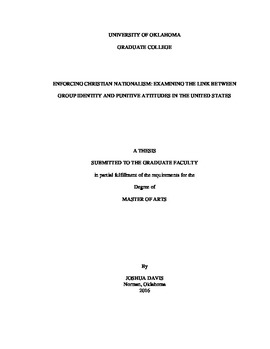| dc.description.abstract | I explore how the convergence of one’s religious and national identities influences levels of authoritarian attitudes towards crime and deviance using data from the second wave of the Baylor Religion survey. Drawing on theories of social control and group conformity, as well as previous work studying Christian Nationalism’s influence on intolerance towards out-groups, I argue that the inability of an individual to distinguish between religious and national identities increases their desire for group homogeny and therefore increases their willingness to utilize formalized measures of social control. I use approval of the use of capital punishment, belief that there should be stricter punishment for federal crime, and belief that society should “crack down on trouble makers” as indicators of authoritarian attitudes towards crime and deviance. Using binary logistic regression, I find that Christian Nationalism significantly predicts both desire for strict punishment of crime as well as cracking down on trouble makers, even after the inclusion of a comprehensive battery of religious and sociodemographic characteristics. Christian Nationalism was, however, only able to predict approval of the use of capital punishment at a marginal level of significance after controlling for social and political controls. Possible reasons for this are discussed. These findings indicate that, beyond the influence of social, political, and religious characteristics of an individual, the belief that the United States is, and should be a “Christian nation,” increases desires for group conformity and strict social controls for both criminals and “trouble makers.” These findings further our understanding of religion’s influence over an individual’s understanding of, and attitudes towards deviant members of our society. | en_US |

